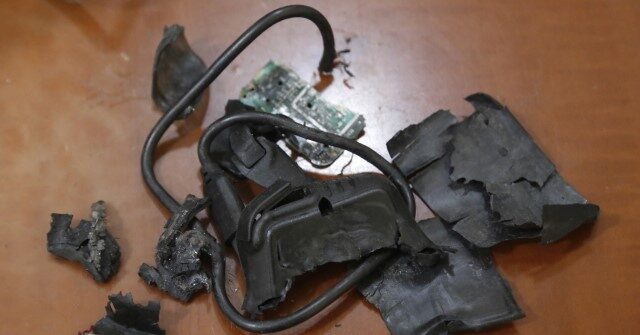The Chinese Foreign Ministry condemned a string of explosions throughout Lebanon, apparently targeting Hezbollah terrorists, on Friday, insisting Beijing opposes “any act that infringes on Lebanon’s sovereignty.”
Chinese state media said the attacks “blurred the lines between military and civilian equipment” and accused the culprits of not wanting “peace in the Middle East.”
Hundreds of pagers, most possessed by known Hezbollah terrorists, exploded in major cities throughout Lebanon and Syria on Tuesday, causing at least 12 deaths and upwards of 2,700 injuries, many of them gruesome. Reports indicated that the Shiite jihadist terrorist organization had adopted the use of the technology, prominent in the 1990s, as a way to evade Israeli intelligence following an order from Hezbollah chief Sayyed Nasrallah this year.
The next day, a second series of explosions reportedly originating from walkie-talkies, solar panels, mobile phones, laptops, and other electronics struck Lebanon on Wednesday, this time killing 20 people and injuring over 450. The attacks have caused widespread panic in Lebanon, where many have begun fearing using their communications devices even as most of the explosions are traced back to Hezbollah members’ devices.
The walkie-talkies in question bore the logos and emblems of a Japanese company, Icom, which denied having manufactured them. Icom said in a statement it had not manufactured that model of walkie-talkie for a decade, but that Chinese counterfeiters routinely sold them online.
No individual, group, or state entity has taken responsibility for the attacks. The Lebanese government and Hezbollah both blamed the Israeli government, providing no direct evidence implicating Jerusalem. Multiple reports in international media, including American media, have also claimed to find indications that Israel orchestrated the bombings.
Hezbollah has been waging a campaign of terrorism against northern Israel for months, however, in support of the fellow Iran-backed jihadist group Hamas, and Israeli leaders have increasingly hinted at moving towards a full-scale war against Hezbollah. Hamas orchestrated an unprecedented slaughter of Israeli civilians on October 7, 2023, that resulted in almost 1,200 deaths, the capture of 250 hostages, and widespread atrocities including gang rape, torture, and desecration of corpses.
The Hezbollah campaign against northern Israel has displaced an estimated 60,500 people. Israeli officials added bringing the displaced home to its list of war goals shortly before the detonations in Lebanon.
Chinese Foreign Ministry spokesman Lin Jian responded to an inquiry on the explosions throughout Lebanon on Thursday by warning that the attacks would potentially deteriorate an already volatile situation in the post-October 7 Middle East.
“We oppose any act that infringes on Lebanon’s sovereignty and security and express concerns over possible escalation of tensions in the region that this incident might trigger,” Lin said. “China calls on relevant parties to earnestly safeguard peace and stability in the Middle East.”
The Chinese state-run newspaper Global Times, a mouthpiece for the Chinese government that often offers much less diplomatic commentary than the Foreign Ministry, quoted regime-approved “experts” who fretted that the pager and walkie-talkie attacks “highlight the rising danger of weaponizing civilian communication devices and other electronic equipment in modern warfare.”
“Whoever is behind the explosions surely did not want peace in the Middle East,” one such Chinese “expert,” Qian Feng, told the propaganda outlet.
Another “expert,” Professor Liu Zhongmin, offered, “The explosions not only heightened tensions in the already volatile Middle East, but they have also blurred the lines between military and civilian equipment, resulting in a significant number of casualties and injuries among even civilians, which is unhumanitarian.”
“The pagers and radio attacks further highlight the rising danger of weaponizing civilian communication devices and other electronic equipment in modern warfare, said Chinese experts who warned [sic] the security loopholes exposed by international supply chains,” the Times added.
China’s response to the attacks is notable because the supply chains the exploding products came from have attracted tremendous scrutiny, and some may lead to Chinese suppliers. Many of the walkie-talkies that exploded on Wednesday have been identified as model IC-V82 transceivers developed by the Japanese company Icom. Icom immediately dismissed itself from the attacks, however, on the grounds that it has not manufactured the IC-V82 model for at least ten years.
“The IC-V82 is a handheld radio that was produced and exported, including to the Middle East, from 2004 to October 2014,” Icom clarified in a statement after the attacks. “It was discontinued about 10 years ago, and since then, it has not been shipped from our company.”
“The production of the batteries needed to operate the main unit has also been discontinued, and a hologram seal to distinguish counterfeit products was not attached, so it is not possible to confirm whether the product shipped from our company,” it added.
Counterfeiting Icom models is such a problem for the company that its website contains a page instructing consumers on how to identify an authentic Icom product. On the page, the company explains that “Almost all Type 2 products,” including the IC-V82, “are counterfeit. It has been a long time since the products were discontinued.”
Many of the counterfeits originate in China. The Emirati newspaper The National reported on Friday that it found IC-V82s widely available for sale on websites such as AliExpress and eBay. AliExpress is a Chinese e-commerce site; the eBay models available shipped from China.
Reuters similarly found dubious Icom models, including the IC-V82, available from “dozens of shops” in China.
“In China, there are dozens of shops selling Icom-branded walkie-talkies on e-commerce platforms such as Alibaba.com, Taobao, JD.com and Pinduoduo, including in some cases the IC-V82 model, according to Reuters checks,” the outlet noted:
Among three China-based vendors of Icom products on Alibaba.com, none of which were listed as official suppliers on Icom’s website … [two] said they sell authentic products, while Quanzhou Yitian Trading Co acknowledged selling ‘Chinese made imitations’ in addition to original products.
Breitbart News similarly found IC-V82 models available on eBay, shipping from “greater China,” for sale on Friday. The AliExpress models claim to be originating from Japan but shipping from China.
Amateur radio enthusiasts have for years grappled with the availability of “suspiciously cheap” Icom products shipping from China. Discussion boards going as far back as 2013 show potential buyers debating whether the quality of a counterfeit from China was worth the reduced price or not.



